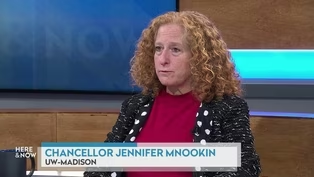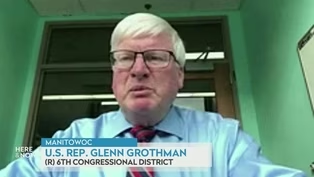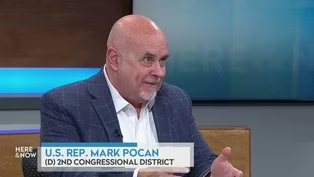Here and Now
The Northern Wisconsin Town of Stella Demands Action on PFAS
Clip: Season 2400 Episode 2416 | 7m 53sVideo has Closed Captions
Residents of a lake community with PFAS contamination are seeking support from the state.
Residents of a rural lake community in Oneida County are advised to limit consumption of fish and deer due to PFAS contamination and are seeking support — as well as more information — from the state.
Problems playing video? | Closed Captioning Feedback
Problems playing video? | Closed Captioning Feedback
Here and Now is a local public television program presented by PBS Wisconsin
Here and Now
The Northern Wisconsin Town of Stella Demands Action on PFAS
Clip: Season 2400 Episode 2416 | 7m 53sVideo has Closed Captions
Residents of a rural lake community in Oneida County are advised to limit consumption of fish and deer due to PFAS contamination and are seeking support — as well as more information — from the state.
Problems playing video? | Closed Captioning Feedback
How to Watch Here and Now
Here and Now is available to stream on pbs.org and the free PBS App, available on iPhone, Apple TV, Android TV, Android smartphones, Amazon Fire TV, Amazon Fire Tablet, Roku, Samsung Smart TV, and Vizio.
Providing Support for PBS.org
Learn Moreabout PBS online sponsorshipthis new initiative, but promised to return to our set and talk about athletics at a future date.
In dental news, at more than 100 sites across the state, from Mount Pleasant to Superior, people are dealing with water contaminated with the man made chemicals known as PFAS.
Here and now.
Reporter Murv Seymour went to the Northwoods community of Stella, which is currently under review for a Superfund designation where residents put health and environmental officials on the hot seat.
>> Stella is a farming community.
town of Stella.
some individuals out here.
>> It's lakes, it's wildlife, the people.
>> Everybody is a neighbor and everybody knows everybody.
reasons people move here.
>> It's a very caring community.
locals never leave.
>> When somebody needs something out here, everybody shows up.
Obviously, it's a good turnout.
have shown up at Stella Hall filling the parking lot and roadsides.
>> We're all here for the same reason.
>> Inside, they fill nearly every seat as they stand together listening.
Because tonight they need answers from town, state and federal officials about their precious lakes and wildlife that are contaminated with man made chemicals known as PFAS.
They're here to work with us.
They're here to answer our questions.
Casey Crump lives in this community.
>> I love the community.
I love the people.
>> He has for almost 25 years.
>> These are neighbors, their friends.
this information session together to provide his community and himself with the first update in almost two years on fact.
>> We're learning more and more.
how contaminated are the water and ground, whose what's the impact on people, wildlife, crops and property values.
Casey's quest for answers is personal.
but now it's even more personal.
>> Like everyone else here.
>> We have permanent residents that live around it, and we have vacationers that come up during the summer.
of questions.
>> What does PFAS do to us when we have it in our body?
And then also, how can we find out if we do have it in our body?
If my well's been tested positive and I've been drinking this well for 30 years, you know, do I have it in my body?
How can we find out about that?
three times the recommended levels.
The town is in the early assessment phase of being designated a federal Superfund site.
Superfund status would mean federal funds and an expedited cleanup process.
Behind Town Hall sits one of many EPA and DNR groundwater testing sites.
Water samples taken from various wells like this are part of the lengthy assessment process, which could take decades.
For now, the DNR tells people within five miles of Stella to limit their consumption of deer meat to one meal per month, and they've been told not to eat deer liver at all.
And they shouldn't eat any fish from almost a dozen different lakes in the area, which includes fish and all of the lakes that make up the heavily populated and popular Moen Lake Chain.
Nearby.
Snowden Lake is on the list, too.
At the edge of the highway, 50 yards from shore, you'll find a wooden gate that leads down towards the lake with a sign that warns people about the contaminated lake water and the risks of being exposed to it from swimming, fishing, or ingesting it.
levels stay the same or are they getting worse or getting better?
panel takes questions from people who have written them on index cards.
>> The rumor is that there were some illegal dumping that caused this.
Is that true or not true?
>> From the third row, retired nurse Jean Peterson, who lives on the first lake portion of the Moen Lake Chain, pushes for the answers she needs.
>> I just believe knowledge is power.
>> The DNR confirms that former owners of the paper mill, now called Ahlstrom and Wausau Paper, are the primary PFAS polluters in the area.
They've notified both companies and their previous owners, requiring them to fund and clean up the contamination.
In an email statement in Ahlstrom, spokesperson tells me they've received the notification and they're carefully reviewing it.
With the recent site inspection report.
The statement goes on to say, we continue to actively engage as a partner with the DNR, EPA and other agencies.
Less than a mile from Jean Peterson's home on the shores of Third Lake and the other lakes, all is pretty quiet on shore and on the water.
Aside from a few boaters fishing and cruising the lake.
One day after that community meeting, I meet Jean Peterson at the Oneida County Courthouse in Rhinelander.
a matter of time before it was us.
>> She candidly tells me she worries about how PFAS contamination will impact her health, and when the time comes, the potential resale value of her home.
>> We had our well tested about 12 months ago, had never heard of PFAS at that time, but we had our well tested just in general and it came back fine.
And we drink bottled water.
>> According to the DNR, lengthy exposure to certain types of PFAS can lead to an increased risk of cancer, developmental delays, thyroid and heart issues, infertility and low birth weights in infants.
Residents are encouraged to use bottled water or treat water that they consume.
>> First visit DNR, gov and search PFAS.
>> The DNR has created an interactive website where people can search and learn if they're in one of the PFAS contaminated zones in Wisconsin.
>> And around the map.
To learn about PFAS in your area or search an address in the box above.
>> You can zero in on your own address or neighborhood to get details on testing and its results.
Jean Peterson and others learned there are thousands of types of man made PFAS in things like nonstick cookware, plastic wrappings, microwave popcorn bags, waterproof clothing and foam commonly used in airport fire trucks.
>> I have a spring on my land.
What do I need to do to get it tested.
>> At that community town hall?
At times, each answer leads to more questions.
on my fields for years and years and years.
I lived on that field.
I grow vegetables in my garden, which turned out really good this year.
But now I have concerns about consuming those vegetables because we water with our well water.
We, you know, we we planted them in the soil that that our property sits on.
And in addition to that, I least out my land.
And so corn is grown on that land.
I think that corn goes to feed cattle and livestock.
Are the cattle in livestock now consuming that corn?
>> What is the plan for when the $125 million that has been sitting there year one, year two unspent.
>> In Madison, state lawmakers have set aside $125 million to help pay for cleaning up PFAS contaminated sites across the state, a drop in the bucket of what will be needed.
perfect wording for that, so it includes all the landowners that actually are innocent.
>> For now, the funds are on hold as lawmakers hash out language in the bill that protects the environment and protects farmers, families and business owners from liability and the anticipated astronomical costs of cleanup.
>> Wisconsin has done an excellent job under the spills law for decades, and but it does need funding.
>> Community groups representing municipalities and environmental groups from all over the state came here to weigh in on the conversation.
>> You don't have to treat the water, to do your laundry, to do your dishes, to flush your toilet.
But you should be treating the water that you're using for food preparation and for drinking water.
situation, the state is footing the bill to test and redrill some private wells.
People are already drinking bottled water and some are paying for the testing of their own wells, something Casey Crump believes his small community might have to do if they want the water quality here to get better before it gets worse.
>> We're willing to step up and we're willing to do and we're willing to do
Chancellor Jennifer Mnookin on Civil Discourse at UW-Madison
Video has Closed Captions
Clip: S2400 Ep2416 | 5m 14s | Jennifer Mnookin on a program to support dialogue amid free speech concerns on campus. (5m 14s)
Here & Now opening for October 24, 2025
Video has Closed Captions
Clip: S2400 Ep2416 | 54s | The introduction to the October 24, 2025 episode of Here & Now. (54s)
US Rep. Glenn Grothman on 2025 Government Shutdown Politics
Video has Closed Captions
Clip: S2400 Ep2416 | 6m 21s | Glenn Grothman on the federal government shutdown and political stance of Republicans. (6m 21s)
US Rep. Mark Pocan on 2025 Government Shutdown Politics
Video has Closed Captions
Clip: S2400 Ep2416 | 5m 50s | Mark Pocan on the federal government shutdown and political stance of Democrats. (5m 50s)
Providing Support for PBS.org
Learn Moreabout PBS online sponsorship
- News and Public Affairs

Top journalists deliver compelling original analysis of the hour's headlines.

- News and Public Affairs

FRONTLINE is investigative journalism that questions, explains and changes our world.












Support for PBS provided by:
Here and Now is a local public television program presented by PBS Wisconsin



